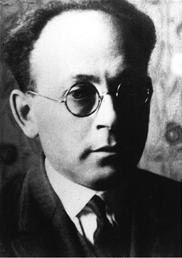David Vogel
דוד פוגל

David Vogel (1891-1944), was born in Satanov, Podolia (now Russia) to a religious family. His father died when he was quite young. From the age of 20, Vogel traveled to the well-known centers of Jewish culture in Eastern Europe. He was living in Vienna when World War I broke out, and he was arrested as an enemy alien. Some of his early poems date from that period. In 1923 Vogel published his first book of poetry. He left Austria for Paris in 1925 and lived there for three years, devoting part of his time to writing fiction in Hebrew. Vogel came to Tel Aviv in 1929, but left for Berlin after a year and later settled in Paris. After the outbreak of World War II, he was imprisoned by the French as an Austrian citizen, and later by the Nazis as a Jew. In 1944, he was deported to Auschwitz, where all trace of him disappeared.
Secular and assimilated, Vogel’s fiction reflects the tortured relationship between Jewish intellectuals and Europe of the early 20th century. His lyric poetry was a daring departure from the Hebrew verse of his time, and was strongly influenced by the Impressionism and Expressionism of central European writing. The last decades have witnessed renewed interest in Vogel’s prose; the republication of his work in Hebrew has established his position as one of Hebrew literature’s great innovators as well as a leading central European writer.
In 2014, Married Life was included in The Independent’s list of Books of the Year in Translation.
Photo by: Israel Sun

